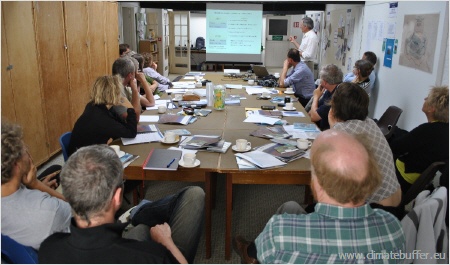Results
The partnership allowed site managers and conservation experts of the partner organisations to participate in nine study visits across Europe, developing their awareness and understanding of climate change, sharing information and learning about knowledge-based site management solutions that addressed the partnership's four priority themes:
- Ecosystem-based adaptation to climate change on the coast, and in estuaries and rivers
- Peatland restoration and climate change mitigation
- Different approaches to invasive species related to climate change
- Carbon footprints of activities and organisation

Discussing the lessons to learn
(Photo: Ralf Schulte/NABU)
Outcomes are presented separately for each of these four priority themes and nine study visits, with further information available such as study visit summary reports and study/theme-specific lessons learnt.
Other key outcomes of the partnership were an analysis of the current vocational education and training (VET) situation in each country, a summary analysis of the lessons learnt by participants and the partnership as a whole, and the development of a best practice training tool kit framework aimed at coast, estuaries and rivers as well as peatlands.
This tool kit is based on information gathered during the study visits, and should be read in conjunction with the separate VET and Lessons Learnt reports:
- Lessons Learnt Analysis: “Managing Nature in the Face of Climate Change: Information Exchanged and Lessons Learnt“ [893 KB]
- VET analysis: “Managing Nature in the Face of Climate Change: Training and Materials for Site Staff” [1.104 KB]
Conclusions
Based on information exchanged throughout the course of the two-year partnership, the following summarises the key findings and conclusions of our work.
European co-operation: The added-value
The partnership has provided a unique opportunity to pool different pockets of expertise, share experience and facilitate access to the wider international networks of four highly respected and leading European nature conservation organisations.
Until now, it has also proved too difficult to include St Helena (UK Overseas Territory) in this type of European cooperation activity due to the remoteness of the island, but their inclusion in this project has brought invaluable insights and experience to partners in mainland Europe that would not have otherwise been possible
The ability to exchange a wide range of information on shared, priority themes will undoubtedly prove invaluable in the development of future training materials and which has already helped inform the development of the best practice training toolkit framework that will be relevant to the wider conservation sector across Europe.
Seeing projects first-hand on the ground in other countries, identifying common issues and challenges, and appreciating different technical and cultural approaches to dealing with climate change has helped participants gain inspiration, source new ideas and cement opinions as to projects and practices employed at home.
The partnership has also helped facilitate discussions with other like-minded conservation organisations working on similar issues and challenges, helping participants develop working relationships, consolidate thinking and build consensus around each others’ organisational focus.
Overall, working closely as a partnership has strengthened the relationships between each of our organisations, providing a platform for future joint working. This has already led to staff from other departments working together and future opportunities for joint collaboration on other issues are currently being explored (e.g. EU policy advocacy, fundraising, coastal management, future EU Lifelong Learning Programme).
Key lessons learnt
- Let nature take its course wherever possible
- Plan long-term and think big
- Managing climate is managing people and we need flexibility
- Effects of climate change may require a spectrum of intervention
- Training available is poor – but the value of getting people together on site and exchanging knowledge is enormous
- Site staff are the real actors: they are the force for change and creativity
Overall conclusions
- Our high level analysis of the current vocational education and training situation in the conservation sector across the participating countries could help inform future training courses and therefore fill the gaps identified by the partnership.
- The best practice training toolkit framework could be adopted and used by nature conservation site managers and other key stakeholders who look after wildlife in the participating countries (and other EU countries).
- This website could act as an important portal of useful information and resources for site managers and other conservation experts across Europe and further afield.
- Our study visit programmes could act as a useful model for future training modules aimed at the conservation sector.
- The approach and concepts arising from this partnership could be developed further by way of a properly funded programme of site-based training, funded by the 2014 Erasmus Lifelong Learning Programme, to be 'hosted and accredited' by an organisation such as Eurosite.
- The study visit programme(s) could be re-run independently, offering a not-for-profit training or knowledge exchange package to relevant groups, staff or volunteers, both national and international.
The project started in 2010 and was finished in 2012.